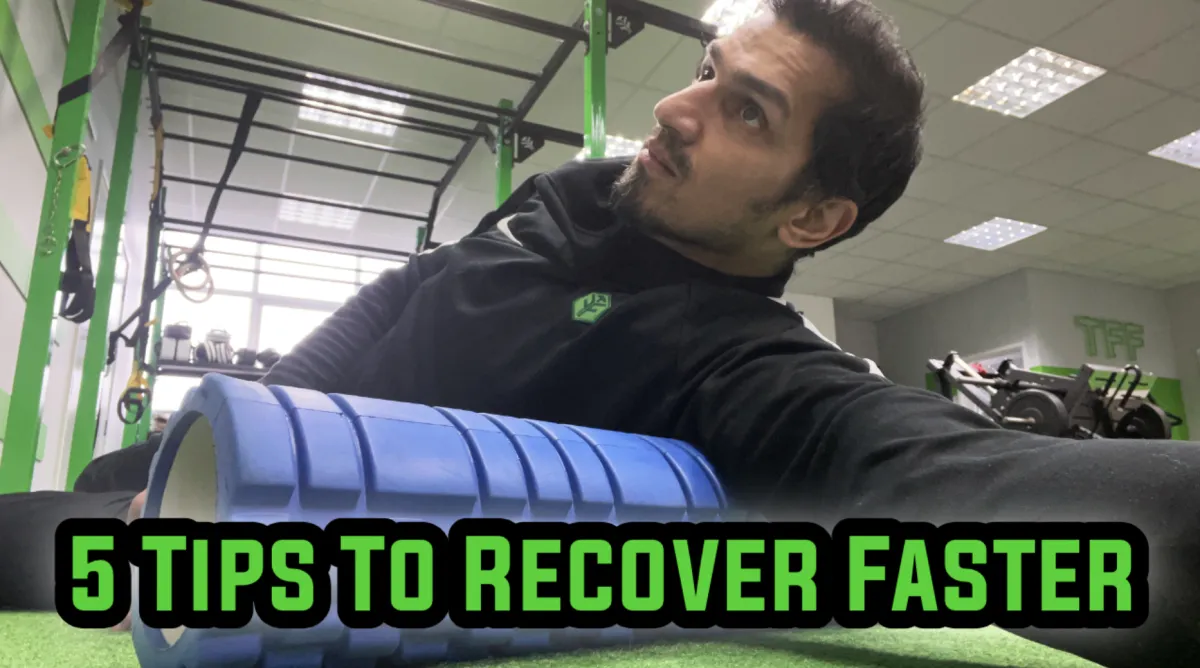BLOG
Elevate your fitness journey with our blog. Find expert tips, member stories, and essential knowledge. Discover, learn, and achieve your fitness goals with us.

5 Things you can do TODAY to improve your recovery
There’s an axiom within the realm of fitness that I adhere to and ensure my clients understand when it comes to training and that is, you can only train as hard and as often as your body can recover.
In other words, The results you demand will be dictated by your ability to recover from your training sessions and, whilst intense training sessions are important to see a change in your body and performance, your goals of an optimal physique and optimal performance (and indeed health) will be compromised if you’re overtraining and under recovering.
It’s common for people to assume that more is better - If I train harder and train for more days in the week then I will achieve my goals faster, right? The answer to that is, potentially.
If you’ve got the time to train for two or more hours a day 6 days a week, then you’ll see an increase in performance if you’re a conditioned athlete but, if like most people that walk through our doors at TFF Fitness, you’ve not exercised for a long time or at all, your level of conditioning and your powers of recovery will lower than that of a seasoned trainee.
In this article, we’re going to discuss what you can do to measure your recovery rate, how you can improve your recovery and the factors that affect your powers of recovery too.
So, the first thing we need to consider is how do you know if you’re recovering well from training?
Essentially, what we’re looking at here is Biofeedback.
What is your body telling you after you workout?
Are you very sore? Being sore a few days after a workout (Delayed Onset Muscle Soreness) is to be expected but if it generally lasts for more than a few days, it’s a sign of poor recovery.
Other factors to consider are your moods, are you very irritable? Do you feel like you’re always getting injured? Are you losing motivation? Have you seen a decline in your libido? Are you losing Muscle? Is your sleep affected?
All of the above are signs that you could be over training.
Want to get a bit more scientific and data driven?
Enter Heart Rate Variability.
What does this mean? Well, basically, your heart beats and is measured in Beats per minute or BPM. If your heart rate is 60 BPM, that doesn't mean that each beat is every second, on the second and constant. There could be variable times between each beat. These are called RR Intervals and you can, with the help of a heart rate monitor and an app, measure these RR intervals to determine your Heart Rate Variability.
Essentially, when it comes to recovery, Heart rate variability should be measured upon rising and determines whether your central nervous system is in a state of predominantly being in Sympathetic (Fight or flight) mode or Parasympathetic (Rest and Digest) mode.
If you’re constantly in a state of sympathetic then chances are, you’re not recovering well from training or at least, should not train intensely that day and allow for more recovery.
But, what could be causing poor recovery?
The first thing we look at, and have alluded to in this article so far, is your current level of conditioning. We call this your training age. Someone who has more experience in the gym or with exercise has a higher training age than someone completely new to the gym, ergo, would have a lower training age and we would expect that person to have a lower rate of recovery.
Secondly, we would look at the individual’s body composition. A higher percentage of body fat would be an indication of cellular inflammation which would have a negative effect on recovery too.
A client’s physical age would also be taken into account. If you’re over 35, you’ll probably remember how you could train in the gym when you were 20 and still go out partying and drinking, till 3am then wake up at 6am and hit the gym hard (Not that we recommend that). When you’re a certain age, you may notice your powers of recovery are not what they used to be either.
So, now, what can you do to improve your recovery?
There are many things we can look at to improve your individual powers of recovery and the above indications of poor recovery provide a clue to some of these.
1. Get Better Sleep. By far, the most important of these is high quality sleep. Ensuring you regularly get at least 6 hours of sleep per night (ideally 8) will dramatically improve your recovery. Remember, sleep is where you go into deep recovery mode.
2. Focus on good Nutrition. The food you eat plays a massive role in your ability to recover. By eating foods that are rich in protein and nutrients, you will aid the process of recovery. Certain foods also provide anti inflammatory responses in the body that can help with recovery.
3.Improve Gut health and Digestive health. If your gut health is compromised, you’ll find recovery a struggle. One of the main reasons for this is that poor gut health can cause inflammation which the body is already dealing with. Adding more inflammation in the form of muscle damage from training will just compound the inflammation. Also, poor gut health and digestive health hampers the absorption of nutrients ingested.
4. Stress Less For Your CNS - Remember what I stated before, There are two modes we operate in. Sympathetic and Parasympathetic. When we’re in sympathetic mode, we’re in what’s known as “Fight or flight mode”
In this mode, our heart beats faster, our kidneys produce more adrenaline and ultimately, we have a stress response within our body that releases cortisol which has been shown to have an adverse effect on recovery. The flight or fight response is our own personal survival mechanism that we developed back when we were cave men and had to run away (or fight) threats such as wild animals but we still have that response intrinsically built into us today.
Ever get scared and feel your arms and legs get heavy? That’s the blood flow being directed to your limbs in order to fight or run away. At that moment in time, your brain is only interested in survival. Blood is pooled away from unnecessary actions at that time in particular, away from your gut.
During the rest and digest phase (The Parasympathetic Nervous System), blood goes back to the gut area which aids digestion. Whilst we can’t ever eliminate the body from going into a state of sympathetic nervous system (In fact, we want to achieve that during training), outside of training, we want to try to be as relaxed as possible. This is why methods such as relaxation techniques, massage, meditation, breathwork, yoga, laughing, reading books and calming music are all recommended to people to avoid stress.
5. Post Exercise Recovery - The above point (Number 4) Segways us nicely into this point which is all about post exercise recovery. In section 4, we stated that during exercise, we’re getting you into your Sympathetic Nervous System. So when should your recovery from training start?
Honestly, it starts when you finish your last rep of your last set. A good cooldown designed to bring your heart rate down with a stretch or even a massage to promote your muscles relaxing is a great way to start as is focussing on your breathing.
Once you’ve destressed a bit, the next part of the recovery process is your post workout nutrition. This doesn’t necessarily need to be had within what was known as the “45 minute post workout window” but it does mean eating a good meal that is easy to digest which contains carbohydrates and proteins to aid the recovery process.
Do you need to have a protein shake? Again, it’s not necessary but I personally find a protein shake (with some added carbohydrates) goes down a treat after a workout and is easy on the stomach and digestive system.
Supplements may also help post workout to improve recovery however, there are mixed opinions and studies regarding the efficacy of many supplements touted to aid recovery such as creatine, tart cherry extract, glutamine or branch chain amino acids. My opinion is, that supplementation usually always offers marginal gains compared to lifestyle and nutrition changes however, if you’re training very hard, marginal gains are welcome!
In conclusion, ultimately, listening to your body is going to provide you the best feedback to let you know how much exercise and training you should be doing. Too much of a good thing can also be a bad thing.
Focus on recovery and your body will adapt to recover faster so you can, in time, add more training stimulus to your weekly routine!
Invest In Yourself!
You deserve to be happy and healthy!
Click the button below to see how we can help you
Click here to schedule a Free Intro. During your intro, we'll make a plan to help you reach your goals
TFF Fitness and Team Fighting Fit are trading names of Famfit Ltd ©2023
